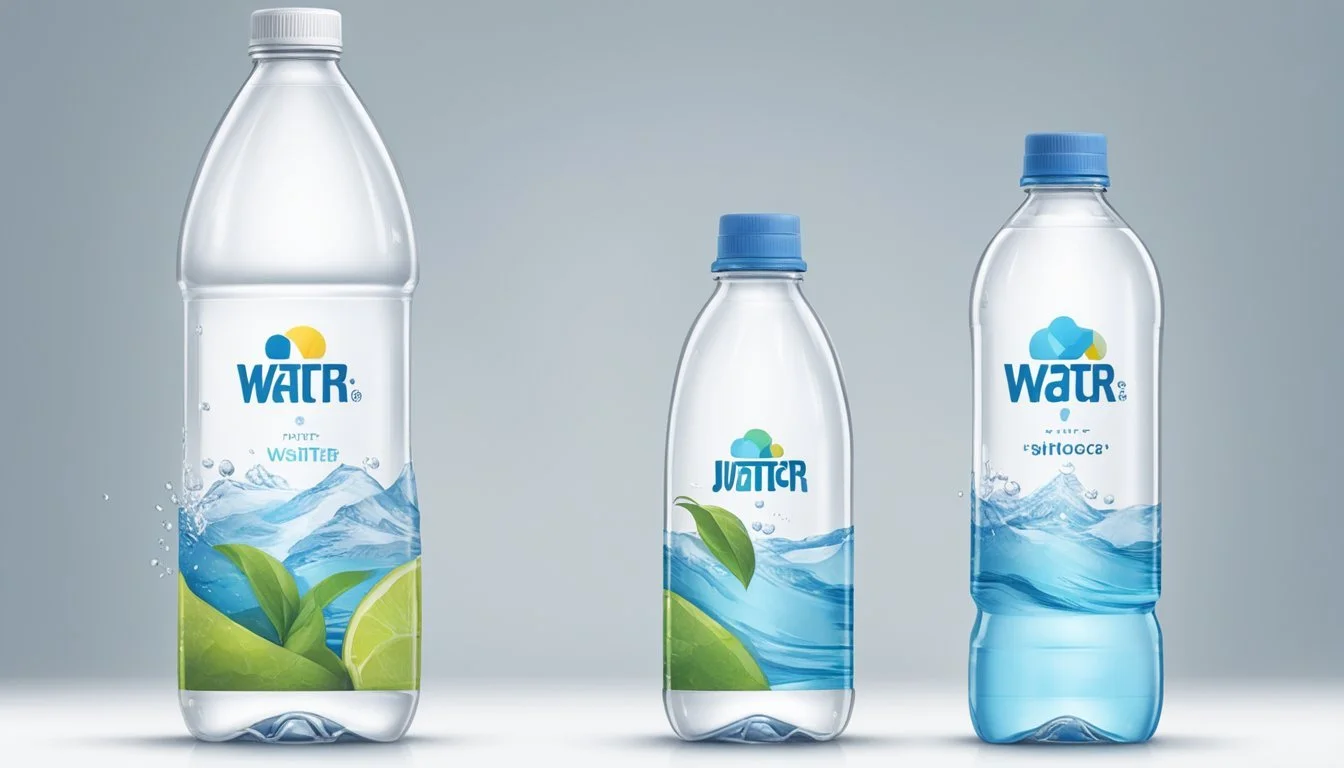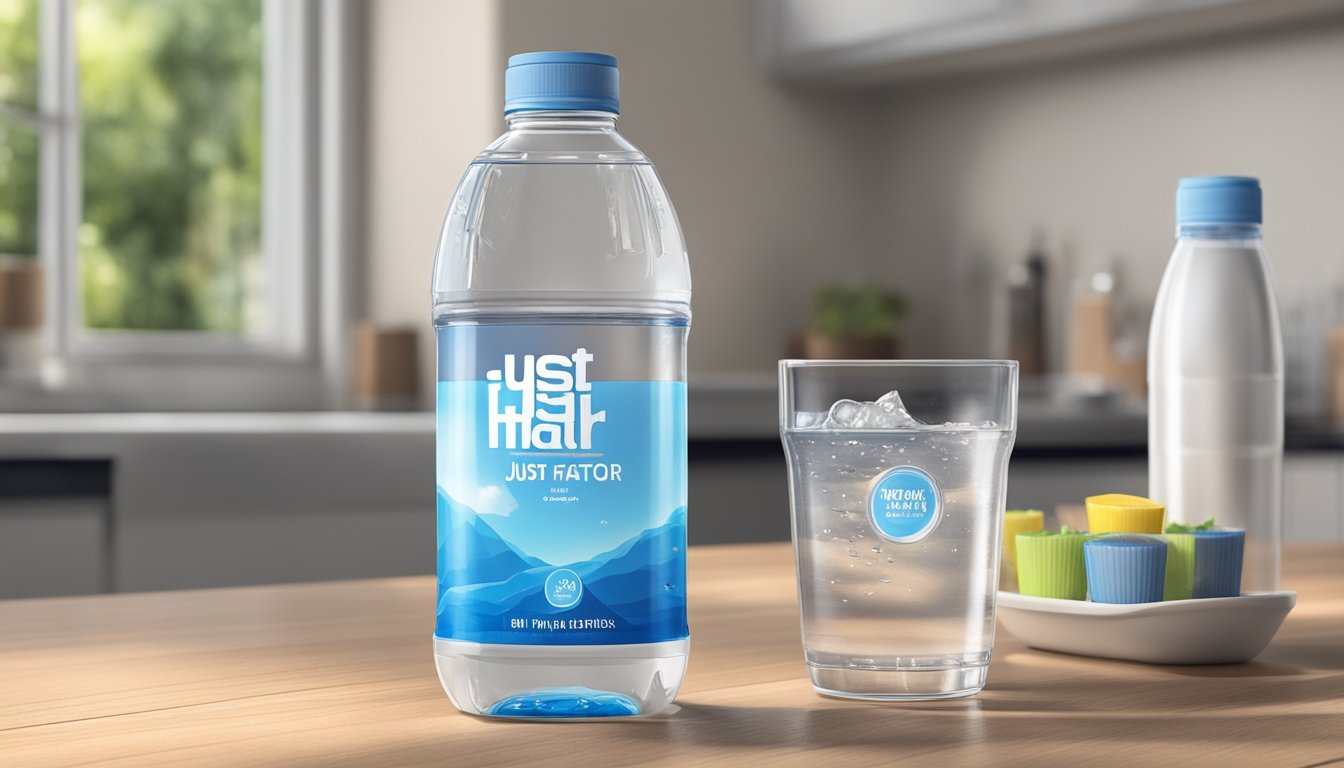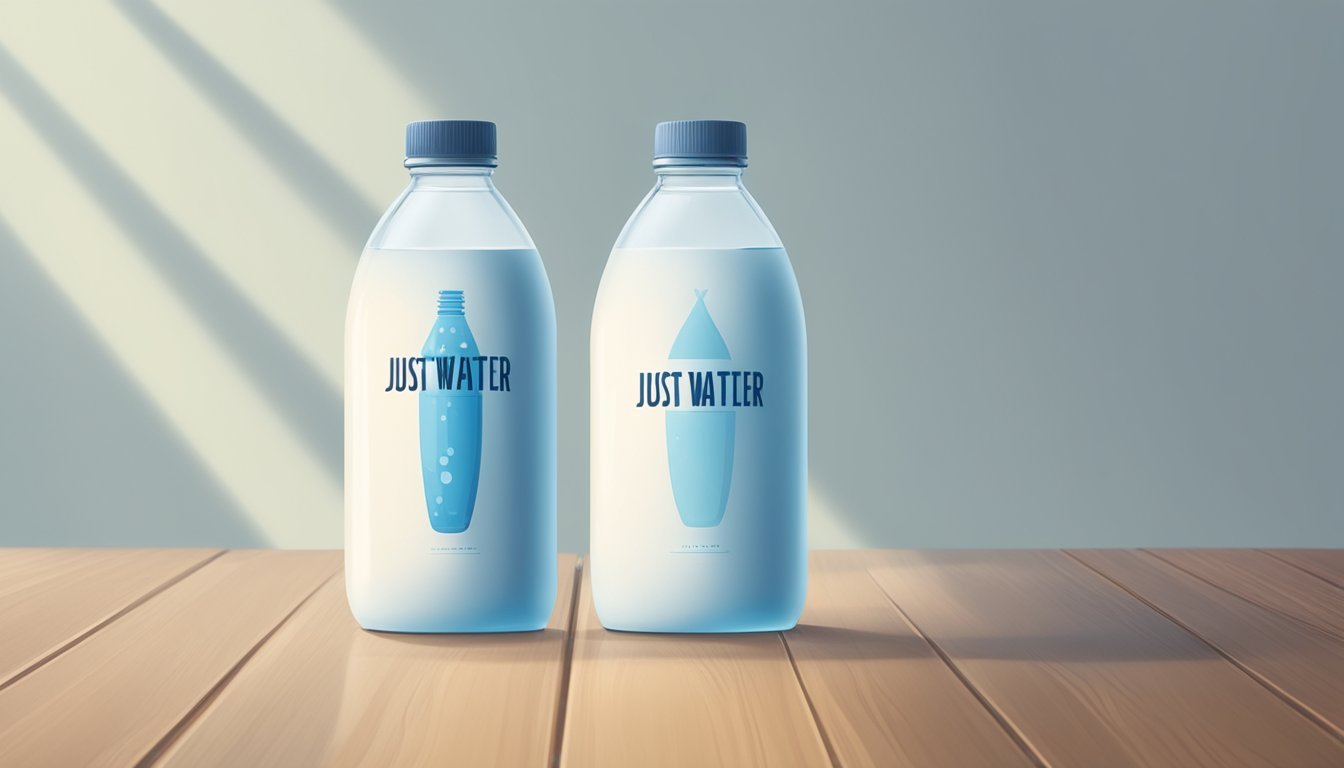Just Water vs. HFactor
Bottled Water Comparison
Choosing the right bottled water can be a daunting task with so many brands on the market. Just Water and HFactor stand out due to their unique approaches to sustainability and health benefits. For those prioritizing eco-friendly packaging, Just Water offers water in a paper-based carton with a sugarcane-based cap, reducing reliance on traditional plastics.
HFactor, on the other hand, positions itself as a premium option with its unique hydrogen-infused water, claiming benefits that range from enhanced athletic performance to improved recovery. Consumers looking for enhanced hydration might find HFactor more appealing due to its specialized formula. However, both brands prioritize quality, making the choice between Just Water and HFactor a matter of personal preference and specific needs.
Understanding the Basics of Bottled Water
Bottled water is consumed globally for its convenience and perceived safety. It includes various types and is subject to regulations to ensure quality. Additionally, bottled water presents significant environmental concerns, particularly regarding plastic waste.
Types of Bottled Water
Bottled water comes in several forms, each with distinct characteristics:
Spring Water: Sourced from underground formations and flows naturally to the surface.
Mineral Water: Contains dissolved minerals and must come from a geologically and physically protected underground water source without the addition of minerals.
Purified Water: This includes distilled, deionized, and reverse osmosis water, which undergo specific processes to remove contaminants and impurities.
Sparkling Water: Contains carbon dioxide, making it effervescent.
Artesian Water: Originates from a confined aquifer, requiring artesian pressure to bring it to the surface.
Bottled Water Regulations
The safety and quality of bottled water fall under the purview of regulatory bodies like the FDA and the Environmental Protection Agency (EPA).
FDA: Oversees bottled water sold in interstate commerce, ensuring it meets strict safety standards comparable to those for tap water. This includes regulations on contaminants, labeling, and processing.
State Regulations: Supplement the FDA's rules, where states may impose additional requirements.
Testing and Compliance: Manufacturers must regularly test their water sources and final products to ensure compliance with safety standards.
Environmental Considerations of Bottled Water
The environmental impact of bottled water is a critical issue:
Plastic Bottles: Most bottled water is packaged in single-use plastic bottles, contributing to significant plastic waste.
Landfills: Many of these plastic bottles end up in landfills where they can take hundreds of years to decompose.
Recycling: While recycling programs exist, not all plastic bottles are recycled, exacerbating the waste problem.
Carbon Footprint: The production and transportation of bottled water contribute to carbon emissions, further impacting the environment.
In sum, bottled water is a convenient and regulated option, yet it poses considerable environmental challenges due to plastic waste and its carbon footprint. Proper understanding and responsible usage can help mitigate these issues.
Health and Safety Aspects
When comparing Just Water and HFactor, it's crucial to consider the health and safety aspects of each. This includes assessing water quality, understanding contaminants, and recognizing the health benefits of hydration and minerals.
Assessing Water Quality & Safety
Both Just Water and HFactor aim to provide high-quality bottled water. Just Water sources its water from municipal systems, which must comply with the Safe Drinking Water Act. This law ensures water is treated for contaminants like lead and chlorine. HFactor, known for its hydrogen-infused water, also follows strict safety protocols to ensure its water is free from harmful chemicals. Ultimately, both brands prioritize consumer safety and comply with regulations to offer safe drinking water.
Understanding Contaminants in Bottled Water
Contamination remains a significant concern in bottled water. Studies, including one from Orb Media, highlight that microplastic particles can be present in bottled water. Just Water and HFactor conduct rigorous testing to detect and eliminate contaminants. Regular monitoring for substances like chlorine, fluoride, and lead ensures that their water is safe for consumption. The Centers for Disease Control and Prevention (CDC) emphasizes that both brands need to adhere to stringent standards to minimize health risks.
Health Benefits of Hydration and Minerals
Hydration is vital for health, and bottled water often contains essential minerals. Just Water boasts naturally occurring minerals like calcium and magnesium, beneficial for bone and heart health. HFactor focuses on hydrogen infusion, claiming added health benefits like enhanced recovery and reduced inflammation. Both brands emphasize the importance of staying hydrated. The presence of minerals like magnesium and calcium can significantly contribute to overall well-being.
Just Water: Brand Profile
Just Water stands out due to its commitment to sustainability, innovative packaging, and quality water sourced from natural springs. This section explores its source, production, taste, mineral content, and environmental and health considerations.
Source and Production
Just Water sources its spring water from the Glens Falls watershed in New York. This area is known for its abundant and consistently replenished water supply. The water is responsibly harvested, ensuring minimal impact on the environment and maintaining the natural ecosystem.
The production process focuses on reducing carbon footprint. The packaging is made from 82% renewable resources, including paper and a bio-plastic cap derived from sugarcane. This combination positions Just Water as a leader in sustainable bottled water brands.
Taste and Mineral Content
The taste of Just Water is often described as pure and refreshing, with a neutral pH of around 7.4. This makes it neither too acidic nor too alkaline, catering to a wide range of palates. The mineral content is balanced, featuring essential electrolytes like calcium, magnesium, and potassium.
Consumers appreciate its crisp, clean taste, free of any significant aftertaste. The consistency in taste is maintained by thorough filtration processes that remove impurities while preserving natural minerals.
Environmental and Health Considerations
Just Water’s packaging significantly reduces plastic waste. Its use of plant-based materials results in a box that is far more eco-friendly than traditional plastic bottles. This reduces the environmental impact by lowering greenhouse gas emissions and reliance on fossil fuels.
Health benefits include BPA-free packaging, reducing the risk of harmful chemical leaching. The water's natural filtration and balanced mineral content contribute to overall well-being by ensuring hydration without the added risks associated with contaminants found in some other bottled water brands.
By prioritizing sustainability and health, Just Water positions itself as a responsible choice for eco-conscious consumers.
HFactor: Brand Profile
HFactor is a brand that focuses on providing hydrogen-infused water, claiming to offer distinct health benefits through this innovation. This section examines the source of HFactor's water, its unique selling points, and the health implications of consuming hydrogen-infused water.
Source and Extraction Process
HFactor sources its water from both fresh spring water and artesian well water. These origins are chosen for their purity and mineral content, providing a clean base for their hydrogen infusion process.
The water undergoes a meticulous extraction and filtration process to ensure it retains its inherent qualities while removing any contaminants. This commitment to purity allows HFactor to maintain a high standard of hydration.
Unique Selling Points
Hydrogen Infusion: HFactor distinguishes itself by infusing hydrogen into its water. This technique is not commonly found in many bottled water brands. The hydrogen is introduced through a proprietary method ensuring stable concentration.
Antioxidant Properties: The hydrogen infusion is marketed to enhance the water's antioxidant properties, making it potentially beneficial for reducing oxidative stress.
Portable Packaging: HFactor's water comes in easily portable pouches, which are designed to maintain the hydrogen concentration and are also convenient for on-the-go consumption.
Health Implications
Potential Benefits: HFactor claims that hydrogen water can aid in reducing inflammation, improving athletic performance, and offering general antioxidant benefits. These attributes are particularly highlighted by users who have reported relief from aches and enhanced recovery post-exercise.
Dosage Concerns: Despite its benefits, some reviews remark on the necessity of consuming multiple pouches to achieve significant therapeutic effects. This raises questions about the practical daily consumption for desired health outcomes.
Clinical Trials: HFactor points to clinical research supporting the efficacy of hydrogen-infused water. While these studies show promise, it is crucial for consumers to critically assess the quality and scope of this research when considering the health claims.
In summary, HFactor positions itself as a unique player in the bottled water market through its specialized hydrogen infusion, with a focus on health and convenience.
Comparative Analysis
This section explores key factors such as taste, cost, environmental impact, and health standards of Just Water and HFactor. Focus is placed on practical aspects important to consumers.
Taste Profile and Preferences
Just Water:
Described as pure with a slight tang.
Purity often highlighted, avoiding any plastic taste.
Generally well-received in blind taste tests for its neutral flavor.
HFactor:
Noted for its crispness and slight hydrogen taste.
Hydrogen infusion claimed to enhance the taste for some, while others might find it unusual.
Blind taste tests typically favor its refreshing quality for those preferring a different palate.
Taste preferences vary; for those who seek consistency and neutrality, Just Water may be preferable. HFactor's unique hydrogen component offers a novel water-drinking experience.
Cost Comparison
Just Water:
Priced in the moderate range.
Generally available at around $1.00 to $2.00 per bottle/carton.
HFactor:
Positioned as a premium product due to hydrogen infusion.
Typically more expensive, averaging $2.00 to $3.50 per pouch.
While Just Water offers an affordable eco-friendly option, HFactor appeals to consumers willing to pay more for perceived added benefits of hydrogen infusion.
Environmental Footprint Comparison
Just Water:
Uses paper-based cartons combined with a sugarcane cap.
Designed to reduce reliance on traditional plastic packaging.
Commitments to sustainability and lower carbon footprint.
HFactor:
Packaged in flexible pouches.
Pouch materials are recyclable but may face challenges in widespread recycling infrastructure.
Efforts to promote hydrogen benefits while considering environmental impacts.
Both brands aim for sustainability, though Just Water's packaging leverages more accessible recycling processes. HFactor's commitment requires infrastructure that may not be available universally.
Health and Safety Standards
Just Water:
Focused on bottling pure spring water.
Subject to routine testing ensuring no contaminants.
Complies with all relevant health and safety regulations for bottled water.
HFactor:
Also adheres to stringent safety protocols.
Infused with hydrogen gas, marketed for potential health benefits.
Extensive testing to ensure the hydrogen does not introduce harmful substances.
Both products meet essential health and safety standards. Just Water emphasizes purity and natural qualities, while HFactor offers innovative hydrogen-enriched options.
Consumer Insights
Understanding consumer behavior and market trends is crucial in evaluating Just Water and HFactor. It helps identify what drives sales and public trust in these bottled water brands.
Market Trends and Consumer Preferences
Consumer preferences show a growing inclination towards sustainability and health. Just Water's eco-friendly plant-based packaging appeals to those prioritizing environmentalism. Meanwhile, HFactor targets fitness enthusiasts with its hydrogen-infused water, positioning itself as a health-conscious choice.
Both brands reflect broader industry trends where clean labels and innovative packaging gain traction. Just Water’s affordability and responsible sourcing practices resonate with cost-conscious and eco-friendly consumers. On the other hand, HFactor’s unique product offering captures a niche market seeking performance-boosting bottled water.
Accessibility and Availability
Product accessibility and availability are vital in consumer purchasing decisions. Just Water benefits from widespread availability in major retail chains and online platforms, increasing consumer convenience. Its competitive pricing makes it an accessible choice for a broader demographic.
HFactor, while also available online, is more frequently found in health stores and specialized fitness outlets. This positioning might limit its reach but strengthens its appeal among dedicated health and wellness consumers. Limited availability may be a disadvantage for HFactor compared to the more ubiquitous Just Water.
Public Perception and Trust
Public trust and perception significantly impact brand loyalty and sales. Just Water’s emphasis on sustainability and transparency in sourcing efforts builds positive public perception. Consumers trust brands that prioritize environmental responsibility and demonstrate a commitment to ethical practices.
HFactor faces a different challenge. Its scientific claims about the benefits of hydrogen-infused water must be backed by reliable data to earn consumer trust. Although it appeals to a niche market, some consumers remain skeptical of its health claims. Both brands need to maintain transparent communication to uphold and enhance public trust.
Final Thoughts
When comparing Just Water and HFactor, choice is crucial. Just Water offers spring water packaged in a box, making it an environmentally friendly alternative.
In terms of health, both options claim various benefits. Just Water focuses on providing pure spring water with a neutral pH, while HFactor introduces hydrogen-infused water, believed by some to offer potential health benefits.
Quality stands out for both. Just Water sources its water from springs and focuses on natural taste and purity, ensuring there are no artificial additives. HFactor, on the other hand, emphasizes its proprietary hydrogen infusion process, which they market as enhancing the water with potential health advantages.
Environmental considerations are also important. Just Water's packaging is mainly made from plant-based materials, reducing plastic waste. HFactor uses traditional plastic bottles, which may not be as environmentally conscious.
A comparison in tabular form:
Aspect Just Water HFactor Source Spring water Hydrogen-infused water Packaging Plant-based materials Plastic bottles Health Benefits Pure, neutral pH Potential health benefits Environmental Eco-friendly packaging Traditional plastic packaging
The source of the water is another notable aspect. Just Water is sourced from natural springs, ensuring a clean, natural taste. HFactor focuses on introducing hydrogen to its water, which some believe can provide added health benefits.
For individuals prioritizing environmental impact, Just Water's packaging might be more appealing due to its sustainability efforts.
Choosing between Just Water and HFactor involves considering health benefits, environmental impact, and water source preferences. Both offer unique qualities, allowing consumers to make informed decisions based on their priorities.
More About Just Water
Core Hydration vs Just Water: Which Bottled Water is Better?
Icelandic Glacial vs Just Water: Which Bottled Water is Better?
Just Water vs Aqua Carpatica: Which Bottled Water is Better?
Just Water vs Cascade Mountain: Which Bottled Water is Better?
Just Water vs Crystal Geyser: Which Bottled Water is Better?
Just Water vs Hawaii Volcanic: Which Bottled Water is Better?
Just Water vs Hawaiian Springs: Which Bottled Water is Better?
Just Water vs Kirkland Signature: Which Bottled Water is Better?
Just Water vs Mountain Valley Spring Water: Which Bottled Water is Better?
Just Water vs Nestle Pure Life: Which Bottled Water is Better?
Just Water vs Richard's Rainwater: Which Bottled Water is Better?
Just Water vs San Pellegrino: Which Bottled Water is Better?
Just Water vs Solan de Cabras: Which Bottled Water is Better?
Just Water vs Talking Rain AQA: Which Bottled Water is Better?
Just Water vs Whole Foods 365: Which Bottled Water is Better?
Just Water vs Whole Foods Italian Still Mineral water: Which Bottled Water is Better?




